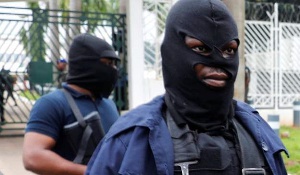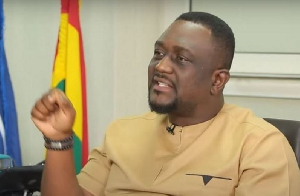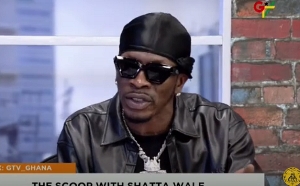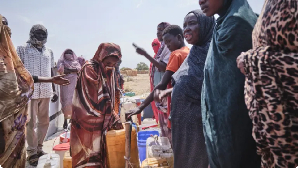Like the stench from Accra's worst gutters, allegations of financial impropriety emanates weekly from the high Office of the President. The stench of corruption has now become intractable from President Mahama himself. The litany of scandals that embroil Mahama, both prior and during his presidency, are a disgrace to his office. Armajaro, STX, Embrarer Jets, Ameri, ENI and Karpower are names that have become by-words for the graft, corruption and mismanagement that have taken place under the President's watch.
John Mahama has been guilty of numerous conflicts of interest that tarnish the distinguished office of the president, indicative of a man whose judgement is questionable. He has colluded in perpetrating some of the worst examples of state-looting in Ghana's history. What is undisputable is that these scandals are worthy of public enquiry; for they are too many to be swept under the carpet. If Ghanaians are to have faith in public institutions, it would be remiss to ignore these excesses.
Mahama is a man that has used public office, not for the benefit of the Ghanaian people he purports to serve, but for the enrichment of himself and his cronies.
On an all too frequent basis, financial scandals have reared their heads, thus making a mockery of Mahama's self-published Code of Ethics – a glossy 42 page publication which in theory should serve as a guide for occupants of political office. As impressive as this brochure may be, it is evident that this apparent ode to probity is not worth the paper it is written on. John Mahama himself has contradicted it with alacrity.
Take for instance Section 1.4.4, which stipulates that no political appointee should accept a gift "with an estimated value of GHC200 or more. If the estimated value is GHC200 or more, the gift may be retained while in office but must be declared in the interest of the individual." It goes on to provide a rationale for this stipulation, and nobly so, by stating: "to avoid the creation of appearance of an obligation, gifts in cash or kind are not to be solicited or accepted from a commercial enterprise or any other organisation."
The debacle that was the STX Housing scheme is already well known. During his tenure as Vice-President, in order to nail down the finer details of the deal, Mahama led a 12-man delegation to South Korea to negotiate on behalf of the nation to get the best deal for Ghana. Yet Mahama and his delegation left the negotiating table, each with the sum of $2600, having sold Ghana down the river in a botched deal – a deal which has resulted in the sum total of zero units of housing being built. Meanwhile, the Koreans were effectively given free land.
This grand scheme of malfeasance was one which Mahama himself personally led; one that he and his corrupt cabal personally profited from. And with extraordinary gall, Mahama has the nerve to claim he has never taken a bribe? Ridiculous! Even if the aforementioned sum of $2600 was classed as a "gift", which it cannot be, it puts Mahama in a position where there was a conspicuous conflict of interest – a fact made all the more egregious, as the project failed to deliver what was intended.
It also put him in a position where his hand was weakened when it came to accountability and scrutiny of the project. If Mahama and his ill-fated entourage had an ounce of integrity, they would have either handed back these monies, or declared the cash and donated it to charity. But alas, that would be too much to expect from a band of malfeasant reprobates.
A recent example of Mahama violating his own Code of Ethics is his receipt of a brand new Ford Expedition vehicle in 2012 from a Burkinabe road contractor whom, interesting enough, was awarded the contract to build the 46.4 km Dodo Pepeso-Nkwanta road. This is a gift in kind that far exceeds Mahama's GHC200 limit, and the President did not deem it prudent to declare it.
It should also be added that contrary to Ghana's procurement laws, whose purpose it is to seek the best value in the interests of the state, this project was not put out to an open competitive tender process. Another project that completed under the auspices of this same contractor was the building of the wall surrounding the Ghana Embassy in Ouagadogou at a cost of $600,000 – an extravagant cost for an embassy wall by any stretch of imagination.
Lo and behold, further investigation reveals that this Burkinabe contractor, a Mr Djibril Kanazoe, is a personal friend of Mahama. This sordid episode is tarred with conflicts of interest that the President, in his capacity, should have been well aware of.
Mahama's risible Code of Ethics, in Section 1.33 goes on to hypocritically counsel against what it describes as "influence peddling", which it describes as, "the illegal practice of using one's influence in Government, or leverage with persons in authority, to obtain favours or preferential treatment from another, usually in return for payment (either in cash or kind)." Mahama undoubtedly used the office of President to ensure that his friend, Mr Kanazoe, received Government contracts for which no other tenders were received, and at inflated prices as the Ouagadougou embassy wall would attest to.
From these grubby little deals with his good friend Mr Kanzoe, Mahama benefited in kind with the receipt of that Ford Expedition vehicle. If Mahama has any sense of shame, he would admit his grand faux pas and return this tainted "gift". For the sake of the integrity of the high Office of Presidential, Concerned Ghanaians implores him to do so.
An examination of Mahama's history in public office indicates that influence peddling is something that he has quite a predilection for. Take for instance Mahama's interjection, as then Vice President, to allow Armajaro Ltd, a company that had been banned from trading in Ghana, to resume its activities.
This was a British company that had broken the laws of the land due to its involvement in smuggling cocoa from Ghana to Ivory Coast. It was thus forbidden from trading. Yet after some lobbying from UK government officials Mahama covertly lifted the ban that had been in place.
It should be noted that the Sunday Times, a British newspaper, had exposed the British High Commissioner to Ghana, one Nicholas Westcott, accompanying Mahama to dine with a UK Foreign Office Minister for Africa, Henry Bellingham.
At the aforementioned rendezvous, Mahama no doubt gave assurances to look into the matter of Armajaro's proscription. It is no coincidence that a few days later, the ban was overturned. The whole business is surrounded by the stench of corruption. For the sake of some wining and dining, Mahama had no compunction in in selling out Ghana to a foreign company that is prepared to wantonly trample all over our national interest.
That it took a foreign newspaper to expose Mahama's shenanigans is rather worrying. It begs the question of what other underhand dealings are going on under the President's watch? Are the Armajaro, STX, Embrarer Jets, Ameri, ENI and Karpower scandals the tip of a murky iceberg?
The scandals in which Mahama has become embroiled in are indicative of a man who entered politics, not with honourable intentions, but to enrich himself. Compare and contrast with Nana Akuffo Addo, who, though admitting "he is not perfect a perfect man by any stretch of the imagination", described his mission as thus, "my intention is an honest one. I'm not in politics to enrich myself, that's not the reason I came into politics."
The sleaze and corruption Mahama has presided over is a disgrace to his office. Like gangrene, it has affected all parts of his administration. Mahama and his malfeasant cronies could start to restore credibility to government and public institutions by declaring all "gifts" (better known as bribes) received – both in cash and kind – and returning them. Where it is not feasible to return cash gifts, the recipients should make a donation equivalent to the size of the "gift" to charity. If Mahama's so-called "Code of Ethics" is worth anything then he and his government should practice what it preaches.
At a time when Ghanaians are struggling with the cost of living in these straitened economic times, Mahama and his government enriching themselves by virtue of their positions is highly insulting.
Concerned Ghanaians therefore demand that all "gifts" received - both in cash and kind should be returned.
Opinions of Wednesday, 29 June 2016
Columnist: Concerned Ghanaians
Mahama must return all gifts received
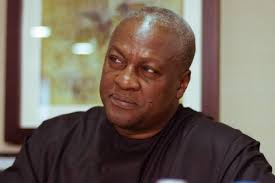 President John Mahama
President John Mahama


